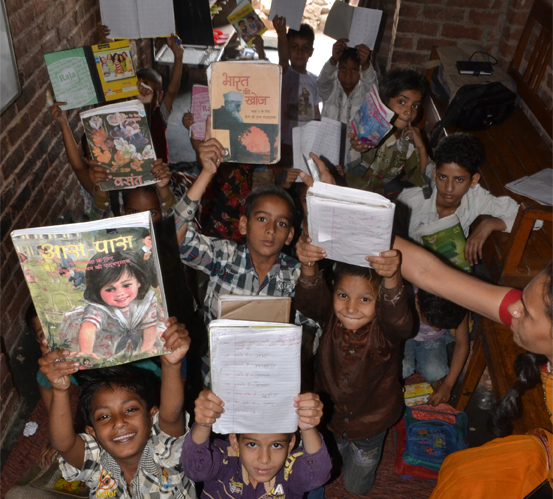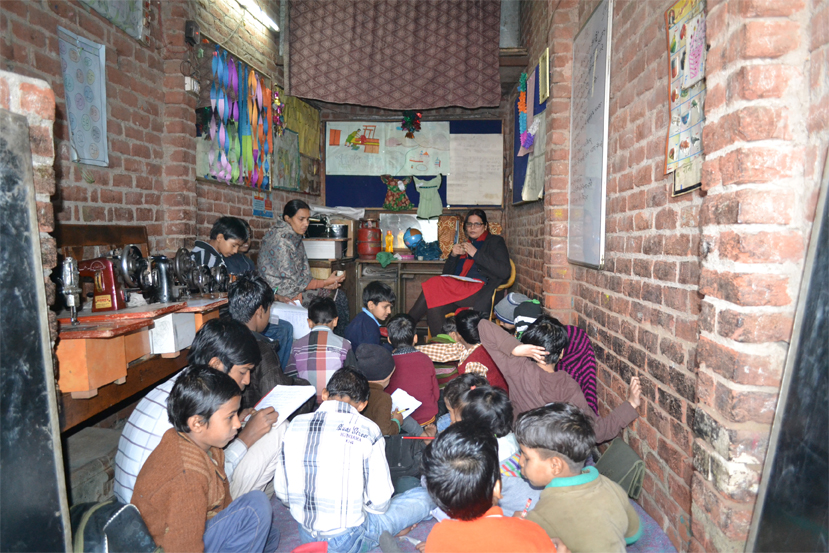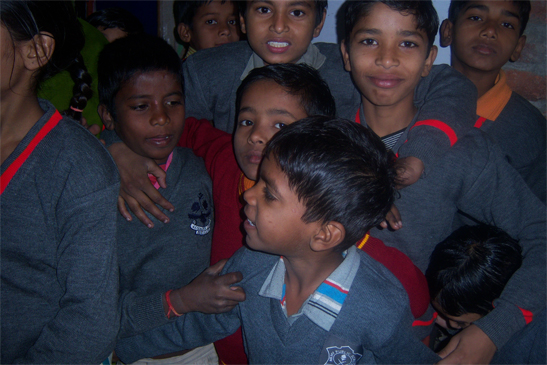Description of the Activities to be Undertaken
1.Mainstreaming children into formal schooling
The project intends to ensure that children are enrolled into formal schools. The target is of enrolling a minimum of 100 children (girls and boys) into government schools. The age group of this will be from 6 to 14. Out of these about 70 children will be those who are studying in the bridge classes in the Centre and about 30 will be those who are directly mainstreamed. For enrolment, the Centre assists in completing the formalities and meeting with the authorities, training and preparing children for the appropriate class in which they will be enrolled; there will be morning and evening classes for bridge education which will take both girls and boys. Target group will be child labour, potential child labour and school drop- outs.

2. Conducting bridge classes in three groups
Morning bridge classes will be held for the age group of 6 to 14 years. Classes will be conducted in the morning from 8:30 am to 12:30 pm. Subjects taught will include Hindi, English, Maths and Urdu. They will be divided in accordance with their age group. The syllabus followed will be the one taught in government schools. The preparation will be done in accordance to the government school syllabus. The children will be given individual attention as per the requirement of each. Children will be made to write on the black board in order to give them confidence. Tests will be conducted regularly to ensure that the child is able to grasp what is taught to them.
3. Facilitating Interactive classes and allied activities with educationists/health specialists/experts and activists
There will be interactive sessions with children conducted by the teachers everyday in which children will be taught about their surrounding as well as cleanliness. Children will be made aware of major events taking place in the country. There will be discussions on the issue of child labour and the impact of child labour. There will also be sessions by experts/health specialists/activists so that critical issues such as women’s health, domestic violence, drugs and other such critical issues ,which are not a part of the regular syllabus, are discussed. This will enable an overall growth of the children andmake them more confident.

4. Training for Shikshaks/ Teachers
Trainings for shikshaks will be organised in child psychology, creative educational tools and techniques and community action. Trainings will be conducted by experts in the field. Credible activists, academics and NGOs will be approached for it.
5. Extra-curricular activities through Baal Manch
Children will be trained to take leadership in the community. Sensitized children will go a long way in improving the condition of the locality. Bal Manch will ensure participation of the children through various activities beyond the regular curriculum, help them to develop their skills and gain confidence. Through BalManch activities will be organized for children of Janta Colony. Bal Manch was started in 2004 with the aim of involving children in larger activities as well as to bring those children into the group who are not enrolled in the Centre. At present there are around 200 to 300 children in BalManch. The members of Bal Manch also include those children who are mainstreamed in government school.

Bal Manch will be reorganised so that there are units in each mohalla. The minimum number from each mohalla will be 10 and maximum will be 25.Bal Manch will take responsibility of running the library. They will give inputs on the functioning of the school with the help of one shikshak. Children will be encouraged to suggest reading materials, books, etc. Bal Manch will also coordinate a monthly newspaper where the articles will be primarily focused on the concerns of the children. This activity was started in the last phase and will continue in the current phase with active involvement from children. The will be activities like story-telling on issues, painting competitions, essay writing competitions. Bal Manch will also take active part in organizing events for the community as part of facilitating the Right to Education. Monthly meetings of BalManch will be held and records of the meeting will be kept.
6. Follow up with mainstreamed children, in formal school and with the community
Once children are mainstreamed into government schools, there will be a process of following up with them. The shikshaks will keep in touch with the parents of the children and also with the government schools to ensure that the child is able to cope up and study. Needed help within the capacities of the centre will be given to ensure the same. The effort will be to ensure that the children are enrolled through the centre do not drop out and complete their formal schooling.
7. Activities with focus on Adolescent Girls
Bharat JantaSchool intends to ensure that girls, particularly those who dropped out from studies after primary and middle level are able to access gainful employment opportunities. Therefore vocational training will be provided for girls between the ages of 15-21. At the same time they will be encouraged to complete formal education. 1) Afternoon classes will be held in the school for 6 days in a week. Tailoring course will be organsied and about 40 girls will be trained in 2 batches of 20 students for 6 months each; 2) Beautician course classes will be held 6 days a week. About 40 girls in 2 batches of 20 students will be trained for 6 months each; 3) Craft course classes will be held 6 days a week. About 40 girls in 2 batches of 20 students will be trained for 6 months each. Interactive classes of adolescents attending vocational training courses and allied activities with educationists/health specialists/experts/activists will also be facilitated by the school to ensure that there is a discussion on general issues and young girls are made aware and taught about how to deal with issues like health problems, drugs, AIDs, domestic violence etc. This also caters to the needs of young married women who can use this opportunity to become independent. The program for girls will require the involvement of two shikshaks who will work with them on these activities. Teachers will keep track of the development of the girls in the program to know the impact of the program.
8. Facilitate enrolment of adolescent boys and girls into formal school
This program is especially started for working boys and girls in the age group of 15-21 years. Children will be are encouraged to fill forms for open school/enroll in government school.
9. Bridge education classes for adolescent boys and girls
Bridge education classes will be held for adolescent boys and girls from age group 15-21. The classes will be held 6 days in a week from 7 pm to 9 pm. working children will be the target group. This group will have access to library. They will also be mobilized to take the lead in conducting the other activities of the centre, particularly campaign and advocacy on the right to education among the community.
Meetings will be organsied with activists. They will be educated about the need to get out of child labour and understand the importance of formal education. Screening of education movies and educational workshops will also be conducted. Computer classes will be conducted. Tests will be conducted to know the improvement and to keep an update on their development. The program will be run by one shikshakwho will devise different techniques to cater to different children coming to the Centre.
10. Programme with Madarassas
There are eight madrassas in the Mazdoor Janta colony and each one caters to the needs of 100 children.It becomes important to make them part of the program. The aim is to impart education on subjects including English, Maths, science and social studies along with their regular religious education. Bharat Jantaschool has made interventions with two madrassas so far- Madrassa KadriyaRizviaTalimul Islam and ChataiWali Masjid Madrassa. As a result children from the madarassas have been enrolled into formal schools. In this project phase the idea is to continue this collaboration as well extends it to other madarassas. With their support the right to education campaign will be strengthened. Attempts will be made to enroll the students to school. For those who will not be able to go to regular school will be encouraged to fill forms for the open school.
Library will be functional for children of madrassa. They will issue books and will also have access to newspapers. Computer education will also be started for children of madrassa. Meetings will be organised for them with the community people so that there is interaction and both the groups work together towards a common objective. Screening of films for them on social issues will be organized and discussions will follow on the movie. One male shikshak will be required per madrassa for the residential children. The syllabus taught to them will be catering to the needs of the children. They will be taught every day for an hour. The initial plan is to be able to facilitate secular subject classes in one madarassa, provide library and newspaper services in twomadarassas and network and build similar relation with two others. Collaborative initiatives will also be undertaken in organsing joint programmes. Madarassas will be encouraged to join in the School ChaloAbhiyan activities.
11. Community Action with focus on Government school for improvement in capacity and quality of education
This activity will focus on mobilizing the community through community meetings as well as through the shikshasamiti to take up issues related to improvement in government schools. Visits to government schools will be organized regularly. Members will go in groups of 5-8 to meet the principal and teachers and discuss everyday problems faced by the children. The focus will be largely on improvement of the capacity and quality of schooling. Idea is to have constant pressure on the authorities to make improvements. In pursuit of the objectives, meeting will be organized and memorandums with be given to higher government authorities and education department. Local political leadership will also be approached.
CEC thanks all its donors for their financial support.
Pay using: - (a) Cheque (b) Debit / Credit Card (b) Net Banking
Pale and grim-faced, 11-year-old girl, Urooj, moves along a childhood that does not know any joy, or playfulness. Read More